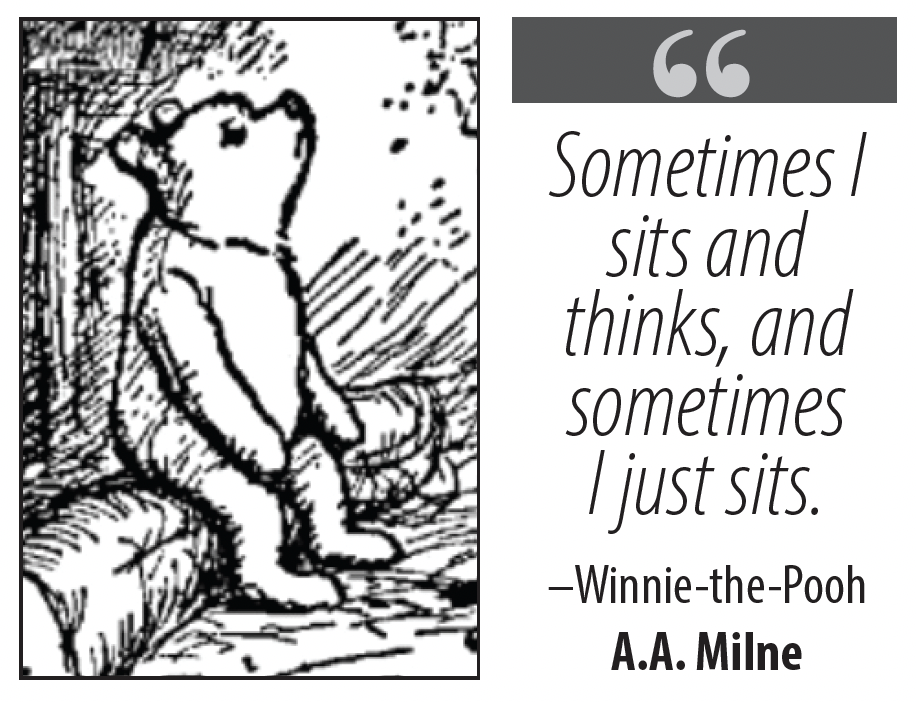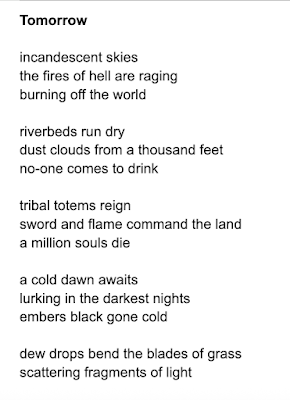Some sparks flicker into the night sky, float for a while, and are then snuffed out. Some sparks settle and sit for a while before being fanned in to life by the wind, itself sometimes a gentle breeze, other times a gale. I think creativity can be much like that. To extend the simile, it begs the questions: what are the sparks, and how do we create the wind that fans those sparks into life?
I was thinking about our own life in retirement, Lorraine and I. While it has at times felt empty, less than purposeful, at times even pointless, it has also been dotted with acts of creativity.
Last winter the frost had frozen the moisture inside this terracotta pot, and broken a piece off the rim. Throw it out? No .. try this 're-imagining'.
Lorraine has always been a 'crafter', specifically a knitter and a crochet'er (is that a word?). She spends some time almost every day doing one or the other, creating garments for premature babies, or blankets and toys for cats at the SPCA .. daily acts of creativity.
Nearly five years ago I found myself writing poetry. Why? No idea... my experiences of poetry at school weren't positive so this came as something of a surprise. My current 'thing' is to take old nursery rhymes and re-imagine them in some way.
That privilege allows me the time to stop, it allows my brain to be bored. Professor Peter O'Connor co-authored a great wee book titled 'Slow Wonder', a beautiful read that espouses the benefits of slowing life down. That 'slowness', that time, that boredom, is essential to creativity.
 |
| Heartily recommended.... |
These small examples of creativity in our lives will be dotted all through every community, but it's mostly too difficult to step back and see the coherent whole. I suspect too that because we don't see commercial benefit from these individual acts we think therefore that they have no value.
This is to miss the point that such creativity is an essential part of simply being human. It is central to our lives. There is no need for it to yield some dollar value. The urge to look for a dollar value reflects the degree to which we have lost the ability to simply 'be'. I well recall in my time on staff at Christ's College when the chaplain in sermons often urged the boys to see themselves as 'human beings', not as 'human doings'. This was his way of saying that we need to allow ourselves the time and the pleasure of sitting and being bored, of being at home with our existence.
These acts are the 'sparks' that float in the air of our communities. And like the sparks from a fire, some of these sparks of creativity will die in the rain. Others will, however, be fanned into life by the winds that blow around us.
The wind might be individual passion and self belief and the simple 'urge to create', perhaps the result of an urge as simple as curiosity. However that wind might also be the wonder and encouragement of friends and community. If we accept that creativity is central to learning, this is where a 'learning city' comes into its own. An idea attributed to Confucius, and voiced by Dan Siegel, Ursula K. Le Guin, and Richard Feynman, says that "the beginning of wisdom is to call things by their proper name", the idea that to name something is to be able to understand and control it".
By naming our city as a 'learning city', we allow ourselves the opportunity to understand what learning is, what creativity is, and so be able to foster and grow our individual and collective creativity. That is one of the focii of 'Ako Ōtautahi-Learning City Christchurch'. It's LCC's job to encourage the sparks and send them into the air, and thento fan the flames, whether with a gentle puff of wind or a force 10 gale.
Let's acknowledge and celebrate the creativity that abounds within and between human souls. Then and only then can we gather the corresponding economic benefits as we reveal, nurture, and grow, a creative population, although that economic benefit should not be our main reason for doing so. The whole will certainly be more than 'the sum of our parts'. We must first see creativity as a part of simply 'being', we must allow ourselves to slow down and simply 'be'.
I think I feel another poem coming on.




























